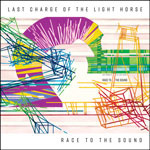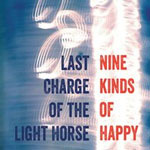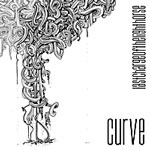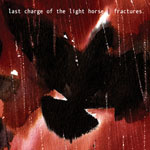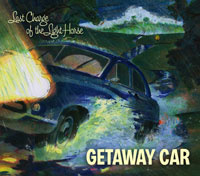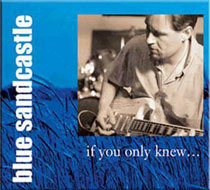Features
Jean-Paul Vest of Last Charge Of The Light Horse: The Daily Vault Interview (2018)
by Jason Warburg
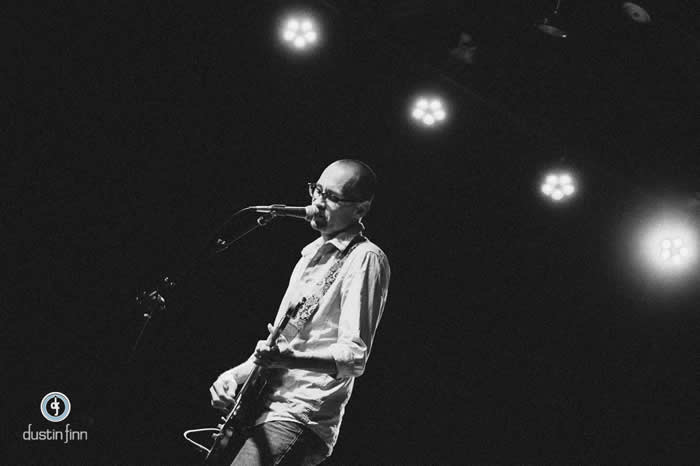
The first three albums released by Last Charge Of The Light Horse, the vehicle for the songs and voice of Long Island singer-songwriter-guitarist Jean-Paul Vest, each won Indie and/or Album Of The Year awards from yours truly in the Daily Vault’s annual “Best Of” recaps. The January release of the group’s fourth full-length Race To The Sound thus immediately qualifies as an event. And it lives up to expectations; from narrating the creator’s eternal battle with self-doubt, to examining a particularly twisted relationship, to celebrating burdens suddenly lifted, Race To The Sound is filled with searing moments of insight described with a novelist’s precision and a poet’s imagination. During a recent Facetime chat with Jean-Paul Vest, we covered topics ranging from detailed background notes on each of the 10 new songs, to calculating the true rewards of working in an industry where consumers expect your product to be free, to the realization that, to most of the people you cross paths with, you’re just another extra in the movie of their life. Enjoy the journey.
Daily Vault: Your songs are full of sharply drawn insights about relationships and the creative process, and even get into a bit of social commentary this time around. I’d love to hear more about the backstories behind the songs on Race To The Sound.
Jean-Paul Vest: Sure, let’s walk through them. The first one, “Where The Winter Ends,” is about this time of year. In the past four or five years I’ve become an avid runner, and when I can’t run for two three days I really feel the itch to get out. Last February I had a bad chest cold and wasn’t been able to run for two weeks, and finally one day it was like a fog had lifted. You don’t realize how bad you’ve been feeling until suddenly you feel completely healthy again. I went outside and it was the first warm day where we could leave the windows open and crocuses were coming up and everything felt new and exciting again.
And that dovetailed nicely with me feeling like writing again. I seem to get about a week and a half a year where everything’s flowing right and I’m in the right head space and have the time to devote to it where I can write. Those were almost the same two feelings approached from different directions.
Maybe it’s just me, but I really enjoy it when a songwriter or poet or author writes about the act of writing itself. I always find those descriptions fascinating.
I find I come back to that a lot. I almost feel like it’s cheating, to write about writing, but I feel like I have a relationship with music where we don’t always get along, and it’s a relationship as rich and varied as a relationship with a human being. “Where The Winter Ends” and “Five Feet To The Meter” are the bookends of writing about writing on this album. “Five Feet To The Meter” was fun. I knew it needed something else, and (Co-Producer) Jim Watts had the brilliant idea of asking Matt Darriau to play clarinet on it, and I love how that came out.
That felt really unexpected but I thought it worked really well.
The clarinet is just so expressive and plaintive, I felt like it captured the mood perfectly. And yet another story about running—that’s a true anecdote about running I put in there [in the last verse]. For a while there I was running at the exact same time every morning. I’m of a creature of habit, but I hadn’t realized to what degree until I ran past this woman who lives down the block, who I’d never met or even spoken to, and as I jogged past she said “Oh, is it 8:00 already?” [laughter] Those are still the only words we’ve ever said to each other. But I thought “Wow, in her life, I’m that guy who goes jogging by at the same time every morning.” It was funny to think of these other existences I’m having without my knowledge.
We’re all the star of our own movie, but we’re an extra in everyone else’s…
Exactly.
Moving down the track list, “What If” is a standout.
“What If” is really the central song of the album. I don’t think the album gets made if I hadn’t been able to write it, because I was struggling with that song. I’d been listening to some other artists whose stuff I really like and wanted to write something that was a bit challenging from a chordal perspective and a rhythmic perspective and was really hitting a dead end where it wasn’t coming out at all the way I wanted. And the song kind of pivoted itself to almost a more pop song, and the lyrics are about the whole process—I guess it’s writing about writing again.
As I’m writing there’s a lot of baggage I carry, that internal voice asking “Will people like this one?” And finally the thought came to me: “Look, if all you ever do is play music in your basement, is that enough?” And—and this is really liberating—it is. I’m still happy to share things with everyone, but I really love writing the songs and the best part for me is finishing it and knowing that I’ve got something that I’m happy with and that I would enjoy listening to. So from my perspective the song is about that process of accepting that writing for myself is enough and letting go of writing for that goal I imagined in my head when I started playing guitar in high school.
I owe a lot to Jim Watts for that song. For the last album, the band (drummer Shawn Murray, bassist Pemberton Roach, and guitarist Bob Stander) pretty much just set up in a room and played for a day, and then I redid the vocals on top of that. By contrast, this one was slowly crafted over a couple of years. I’d write a song, record it, send it to Jim, we’d work on it a little more, and then I’d write another song. With “What If” it became this slow, revealing process where I recorded the drums with Shawn and worked on that slapback echo effect that’s such a part of the rhythm, and got the guitar and the singing down, and then I sent the files to Pemberton. And then he sent it back with this great bass line, and I spend a day just being deliriously happy about that, and then it went out to Jim in LA, and he put this amazing breakdown in the second verse, and his friend Scott Dougherty laid down a string section on synthesizer that I wasn’t even expecting, and that just took the whole song to a whole other level. That was fun to work on.
I love the song, and the way the strings push up at the chorus is wonderful.
I appreciate that. There’s another thing to listen to there, again with huge credit to Jim Watts. I have a very simple recording set-up here. I kind of like the limitations that imposes on the process; you get what you get. But we recorded the drums with just two microphones, one stuck right in the kick drum and one overhead, pointed down at the snare but kind of capturing everything else. And Shawn is such a good drummer and able to play to what the mics are picking up that he can adjust how loud he’s hitting each thing, it’s really amazing. The result is that the main drums on “What If” are in mono. That’s offset a little bit by the slapback effects that we’re using, but Jim had the brilliant idea to ask his drummer friend who lives around the corner, Fernando Sanchez, to play along with Shawn on the choruses so that as the chorus comes in, the drums are suddenly in stereo, and everything widens out, and at the same time the high end opens up and Jim doubles the bass with the synthesizer so the low really drops in, and the song becomes bassier and wider and bigger all at once at the chorus. I love the little jolt of energy it gets.
That’s fascinating—I was trying to figure out what “additional drums” meant in the liner notes! Okay: “This Room.”
My great fear with “This Room” is that it was just going to come out like an angry Yelp review. [laughter] But you really feel it sometimes when you go to a place like the motel room in question. It’s not only that someone didn’t care about the quality of the workmanship, it’s almost as if they tried their utmost to create a room where anybody in it would feel like they made a wrong turn somewhere just by ending up there. The bathroom with just a bare fluorescent bulb and none of the angles are quite right angles, and nothing’s rounded off, everything’s just slapped together. That one seems to resonate with some people right away; I think that’s Pem’s favorite song on the album.
We’ve all been in that room.
We have. Enough said.
“Strange Sat(i)elite” was fun. There’s a little figure in a piano piece by Eric Satie that I latched onto and mutated into this instrumental piece with me on piano, my son Nicholas on trumpet, and the fantastic Jon Preddice of Miles To Dayton playing cello. I wasn’t going to have drums on that, but Shawn was over recording one of the other songs and I played it for him and he says “What if I played something like this?” and immediately I was going “Yes! That! I need that.”
That happened twice on the album, actually. The other track I was going to leave without drums was “You’ve Lost Your Way.” Otherwise it’s just that eerie ring-modulated loop going in the background and me playing guitar and singing. Shawn’s drums added such intensity it that we had to keep them and Jim ended up mixing that song to give the drums a lot of low end power and a deeper, bassier sound than we would have ordinarily gone for. Interestingly enough, that ended up informing how we did the drums for the rest of the album. It’s funny that the song I wasn’t going to have drums on, ended up informing the drum sound for the whole album.
“More” was a song I had been working on for a while and wasn’t happy with, so I rewrote the last verse and added an instrumental break and I’m much happier with it now. I knew right away that I wanted it to be the loud rock tune on the album, and when I first recorded it, it sounded okay, but it didn’t have the power I wanted. And then I went over to Bob Stander’s home studio and he layered on some guitar and suddenly it was ten feet tall and fifteen feet wide and I went “Okay, now we have something!”
That one definitely has the big guitars going for it.
Absolutely. The next one, “You’ve Lost Your Way,” also has a running connection. Shortly after the last election I was jogging through my neighborhood and on consecutive days I had experiences that kind of jarred me a bit. The first day I saw a young man being evicted from a house. I don’t know the story there, but I know that Long Island has a shortage of affordable housing and I thought “Here’s this poor guy, whether he deserves it or not, having to pile everything he owns at the curb and walk away with whatever he can fit in his car.“ That’s tough for anyone, especially when you’re getting yelled at by the landlord and the sheriff is standing there overseeing the process.
The next day I went for a run on the track at the local junior high school and met this little girl who was there with her family. She was about four years old, riding her bike, it’s a beautiful day, she’s a beautiful child, very happy and clearly very proud of the bike, and her smile just kind of made my whole day better. Then I walked halfway around the track and crossed paths with a woman who I had noticed speaking with the child earlier, and the woman greeted me and said “Hi, beautiful day, isn’t it?” and I said “Oh yeah, beautiful day, and a beautiful child.” And she said “Yeah, you know, I told her that if she can’t speak English she should go back to where she came from.”
And I thought, “That’s what you took from that?” It was one of those moments where I wish I had had something clever or insightful to say, but I just shook my head and walked away. It was the lack of rancor in her voice that stunned me the most—it was a very matter-of-fact thing, that if a four-year-old can’t speak English yet, she should get out. That really shook me a lot.
I guess the theme of the song is, if you can’t be at least a little bit kind to those who don’t speak the language or are struggling financially, then you’ve lost your way. That’s as close to political commentary as I get in a song.
And that carried over a little bit into the next song, which is why I put them together. “You Are My Raincloud” was written around the beat that Shawn Murray came up with, and I was having a lot of fun with that, and thought okay, I’ll take “You Are My Sunshine” and flip it around, but then in the second verse I was still kind of fuming about the election and so there’s a line in there about “The snow, like an arrogant lie / Obscures the earth ’neath an insult of whiteness,” and dreaming of a colorful spring, and I thought “Okay, I’m completely happy if people would choose to interpret that in more than one way.”
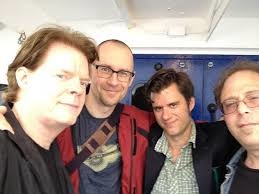
Last Charge Of The Light Horse:
Shawn Murray, Jean-Paul Vest, Pemberton Roach, Bob Stander
Thank you. And then “Into A Corner” was just me having fun with a drum machine. “Cool Night, Quiet Place” is the only one we haven’t talked about yet, and I think that one’s pretty self-evident. I’m pretty proud of that song—I like the chord changes and how the lyric played out, and my friend Martha says that’s one of her favorites. It took a while to crystallize the arrangement. I was stumped at first and so I just sent the guitar and voice out to Jim and he got the amazing Michael Jerome to play drums on it, and Johnny Flaugher to play bass, and then I got Steve Schiltz, who I’d known from playing in bands years ago, to play some atmospheric guitar effects, and Steve actually gave us some great stuff that ended up sort of getting crowded out of the arrangement. I’d like to do a remix with more of that.
I commented in the review that I recognize the character you’re describing in that song with the baggage of grievances.
It’s hard to write a song like that, worrying that someone will maybe recognize themselves and be upset. But my feeling is once it becomes a song, it’s important to have some truth in there, but it’s also important to write it in a way that serves the song. In a song, I feel free writing something in maybe more black and white terms than I would characterize a person in real life. You take a germ of truth and then weave a story around that and it becomes something else.
Finally, before we move on, I want to say that I’m so thrilled with how Tony Ingrisano’s artwork for the album came out.
It’s fantastic, so colorful and charged with energy. Okay, moving on—in the review, I commented on how the musical component of your songwriting has evolved. To me it feels like you haven’t so much mellowed as refined how you approach the songs, moving from the big guitars and drums on Getaway Car toward something that’s more coiled and intense and really focuses in on individual instruments and what they bring to the song, with everything arranged in a very precise way. How do you feel your approach to the musical part of songwriting has evolved over time?
One conscious thing that evolved is that these days I’m frequently writing with a rhythm in mind first and layering everything else on top of that. I think that sprang from a place of wanting to make sure the songs were accessible. I’m still writing primarily on guitar, but trying to challenge myself in terms of not repeating chord progressions and not always playing with the simple 1-4-5 major chords or minor chords. I guess that stems from just getting bored quickly and feeling the need, and the urge, to try something new.
I’ve been listening to some more experimental music in the last few years and I’m a big fan of Louis Cole. He has a band also called Knower that I like a lot, but he has some solo albums. It’s very avant-garde music but with hints of the Beach Boys thrown in and some other things. I love his sense of chords and tonality and I’d very much like to pursue things like that, but my roots always kind of pull me back toward something a little more pop sounding.
I didn’t do this deliberately at first, but the song structure of “Where The Winter Ends” is pretty unconventional in that it’s verse-verse-bridge-chorus-chorus-chorus rather than verse-verse chorus-verse-chorus-bridge and so on. It’s like “Nope,” just lay them all out in a row and walk through it and that’s it. I did make an effort to repeat the chorus because people have reminded me you want to give the listener more times through to latch on it.
To me it feels like it has a natural build; the structure is unusual, but I think it really works because you’re building towards that chorus, which then gives you the big finish to complete the arc of the song.
It does. And part of the reason it builds up to that chorus is the little things that we added—Shawn Murray adding a couple of tracks of shaker and tambourine, for example—that give it forward momentum. And I’m so happy with how Camryn Quinlan’s vocal came out; she was just perfect. I’m imagining a sparrow flying around your head as you’re jogging through a beautiful path somewhere. I asked her parents if she’d be interested in doing it and she came over. She was 10 when we recorded that. I think she just turned 11. I’m just floored that a 10-year-old can sing that well.
Wait. What? She was 10??
Yeah. My good friend Jack Lacitra is a vocal teacher and I went to one of his shows. When Camryn let loose I think everybody in the audience spent about an hour trying to get their jaw back up in place. It was like “Whoa!”
Speaking of guests, Race to the Sound has the largest number of collaborators and guests you’ve ever featured on a Last Charge album, and yet it feels very organic and cohesive all the way through. What was the process like as you and Jim Watts put all the pieces together and assembled these tracks?
We had an even dozen guest artists if you count my son Nicholas and my daughter Gwendolyn. Everybody just put so much of themselves into it. I feel like what makes the album so enjoyable for me to listen to is hearing all these wonderful voices mixing together. I said in the liner notes, between Camryn and one or two of the older performers, there’s a 50-year age difference, but everything fits so well together.
Aaron Palmadessa is a good friend of mine, a fantastic guitar player locally, and he came and helped nail that right George Harrison note for “What If.” Martha Trachtenberg and Tom Griffith are my dear friends and so supportive and encouraging, and such good songwriters. We’ve been playing living room shows together and folk shows where we sit in and sing harmony on each other’s songs and that’s been an education for me.
And then we have three or four guys who are friends of Jim Watts out on the West Coast. I met Scott Doherty when I went out to LA a couple of years ago and we went over to his house and recorded the Fender Rhodes part for “Cool Night, Quiet Place.” Matt Darriau I’ve actually never met; Jim recommended him and sent him the files and Matt recorded his parts. That song went from New York to LA, back to New York, back to LA, and it’s a tribute to everybody who plays on the record that they’re so good at listening and finding the right thing to play.
It was a such a fun journey hearing each new piece as it was added and thinking “Oh, wow, this is going to be great! This is going to fit right in.” I’m very happy with how it came out.
What was it like for you, as the son of a musician yourself, to have two of your kids play on this album?
It was a lot of fun. A few years ago I went out to Victoria to play with my dad (David Vest) for his 70th birthday gig and that was a lot of fun. I feel like we’re opposites on stage; he’s such a natural performer and storyteller and I’m always very much within myself, but it was a lot of fun for us to play together.
It was nice for me to experience that from the other end by having Nicholas play [trumpet on “Where The Winter Ends” and “Strange Sat(i)ellite”]. Having Gwen play [flute on “Where The Winter Ends”] wasn’t something I planned out ahead of time, but once I heard what I wanted in my head, I realized a flute would be perfect. She nailed it perfectly, and had the idea of throwing in the trills, which gave it a little extra energy, and it was fun. It’s just for a moment or two, but it serves the song, and she had fun.
Your friend and bandmate Pemberton Roach has compared your work to Richard Thompson and Leonard Cohen and Lloyd Cole. I hear James McMurty in there sometimes, too. What’s your take on those artists, and how your work relates to theirs?
My take on those artists is that they’re great. I’ve been a fan of Lloyd Cole since college—a very witty songwriter, sometimes kind of mean in a really funny way, but I love his songwriting. Richard Thompson likewise, I’m a devoted fan of his. James McMurtry is someone who Pemberton introduced me to and I’ve been a fan of his ever since. And Leonard Cohen, I mean, WOW.
In terms of how my work relates to theirs, if somebody feels like I need to be mentioned in the same breath with any of them that’s incredibly flattering, though I feel like I have a ways to go yet.
As the way that music is distributed and listened to has continued to evolve over the past few years, how have your goals as an independent artist changed? What are you doing differently from what you did 10 years ago?
I think the difference for me from 10 years ago is that I’m okay with how things turn out. I’m blessed to have a decent day job, so I don’t write with the pressure of “Wow, I really need a hit” or bills aren’t going to get paid.
In a way that’s what the song “What If” is about. This album is a self-funded, self-released labor of love that Jim Watts and I put a lot of our own sweat and tears into. I didn’t run as many CDs this time since people seem to download more. In terms of streaming, the revenue just isn’t there. I noticed today that on one of the streaming sites, it might have been Yandex, someone had streamed one of the songs seven times, and I got paid one hundredth of a penny for that.
I’d sure love it if people would download from iTunes or buy a physical copy on our site, but I’ve decided that I have a limited amount of energy to put into creating the music, and I want as much of it as possible to go into that, so I’m not going to get too upset if I send an album out to the world and three people say they love it and nobody else notices. I’m blessed to know that there are a few people who get it, and feeling that connection—that’s the reward.
What’s next?
We sent the album out to radio and hopefully it starts getting added to playlists. I am doing some radio promotion with Tinderbox again, who have done a great job for me in the past; some of the previous albums have charted on mostly college radio stations. We charted at number one last time on a station or two and that was a thrill. We’ll spend about eight weeks seeing what we can get out of that.
I feel like if I have a chance at a song being pop enough to catch on, “What If” is probably the song, and I don’t know that there was a comparable song on the earlier records. It’s just bouncy enough and just positive enough that it’s registering well with the people I’ve played it for.
I’ll also book some shows with the band. We don’t play live a lot, and the guys are all in other bands as well, but I’m trying to line up some things locally here and in New York City. I’d love to come out to the West Coast and play out there at some point too.
My dad is trying to get me to explore the possibility of playing some of the blues festivals up in Canada and has pointed out to me that it’s not all blues acts on the bill there so Last Charge would probably fit right in. It would be a lot of fun to do a show on the bill together.
And then Eric Schuman and I have talked about the fact that it’s been 25 years since we started Blue Sandcastle, and it might be fun to dip a toe back into hard rock and record a song or two to commemorate 25 years of being friends and making music.
That might be next, but right now we have a whole spring slate of my kids’ music performances coming up, and I need to get out and see some shows by other people. I’m in my own head too much after doing this record and it’s time to get out and recharge the batteries.
And maybe get back to running every day. You don’t want the lady down the street to think something happened to you!
Yeah! Moments like that, those are the parts of life you remember. As I allude to in that song, I don’t always feel like I’m steering when I’m writing. I’m feeling my way along. I’m happy that moment made its way into a song.
